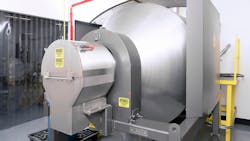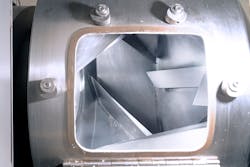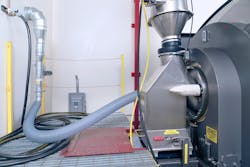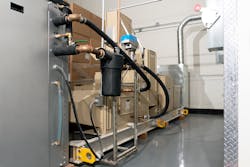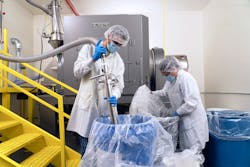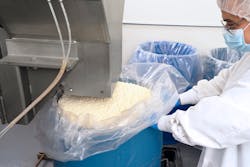Rotary batch mixer takes nutraceutical producer to new heights
Nutraceutical Research Sciences, LLC (NRS), is a private-label manufacturer of nutraceuticals and novel ingredients. The company’s founder, John Anderson, is a 42-year veteran of the dietary supplement industry and has been involved in launching more than 3,500 products.
NRS’s products range from anti-aging supplements and sports nutrition to vitamins and meal replacements. The company has developed proprietary manufacturing processes that rely on a model 700-TS-50-SS rotary batch mixer from Munson Machinery.
Most batches include one or more liquid additions, which are introduced into the 50-cubic-foot (1,416-liter) mixer through spray bars with exchangeable spray tips, enabling the addition of aqueous and oil-based liquids by the liter or milliliter and as a fine vapor. The spray bars operate in conjunction with subsystems for heating and cooling the liquids and dehumidifying and pressurizing the mixer vessel. “We have full control over how we process each product,” Anderson says.
Mixer facilitates highly custom manufacturing techniques
Customization of the manufacturing process enables NRS to micro-encapsulate or coat the ingredients and then add other ingredients, such as flavors, on top of that to build a larger particle. “The mixer’s tumble-turn-cut-fold action ensures complete coverage by the liquid additions,” Anderson says. “It enables us to coat every single particle.”
RDS also connects a dehumidifier to the mixer to remove moisture from the vessel, allowing the company to make one liquid addition after another. “It’s a process that a rotary mixer handles well,” Anderson says. “It’s much easier than with a V-blender, because you have to exchange the air on the fly. The exhaust air will pick up a lot of material, and you'll a have a huge loss.” The rotary blender’s gentle mixing action, on the other hand, minimizes dusting, and its single seal prevents dust leakage from the drum.
With its auxiliary systems, the mixer reminds Anderson of an Apollo space module turned on its side. The company calls the dedicated suite in which the mixer is housed “Genesis 1” because of its novel shape. “It’s one of a kind,” Anderson says. “No one has anything like it. We are growing fast due to these unique and novel custom ingredients we use to make life-changing products.”
Novel processes scaled from R&D to high-volume production
NRS’s processes are developed in its R&D lab. “We built a miniature replica of our process,” Anderson says. “So we can test products in very small batch form — one or two or five kilograms — to create the technique, the technology and the blending instructions.”
The pilot-scale work ensures that each process can run nonstop. “The name of the game is continuous processing,” Anderson says. “When you start the process, you continue through all the steps until it’s completed, discharged and out of the mixer.” While every product requires an individual process, Anderson estimates that the company produces between four to eight batches per eight-hour shift. To keep up with demand, NRS is adding a Munson model 700-TS-90-SS rotary batch mixer with a capacity of 90 cubic feet, which the company plans to call Genesis 2.
Particle size is a big consideration in nutraceutical manufacturing. “Matching and sizing particles is important in blending,” Anderson says. “You can’t just blend 20-mesh material and 100-mesh material in a standard way and then expect it to run through your other manufacturing equipment without separation. But with our pilot prove-outs, the rotary batch mixer and our customization, I can take 20-mesh material, apply some humidity, and then slowly apply 100-mesh material, then dry while mixing without separation. That is unique.”
Minor additions, such as vitamin D3, must be preblended with other materials. Indeed, even preblends sometimes need preblending. That was the case when NRS needed to ensure that each two-piece capsule of a product contained the same tiny amount of chromium picolinate. “The mixer’s uniform blending enabled us to hold it to within just two micrograms either way of hitting 100 micrograms per capsule,” Anderson says. “You have to know what you're doing with raw material and how to introduce it. It's a science.”
Rapid sanitizing verified with swab tests
Between batches, large doors allow unobstructed access to the mixer’s interior for cleaning and visual inspection. Operators steam clean and sanitize the mixer and verify the cleaning process with swab tests. “It’s not complicated,” Anderson says. “The room was built for the mixer and associated equipment, making cleaning much easier than going up onto a mezzanine to clean a V-blender.”
The company also finds the unit cost to be efficient. “Our costs per kilogram or per batch have been greatly reduced, so we’re more competitive with novel products that other companies can’t offer. Someday this may be the norm, but I think we're years ahead of our time,” Anderson says. “Our process also is scalable, and we're also looking at adding a 300-cubic-foot (8,495-liter) rotary batch mixer, where we can do much larger blends. We’ll call it Genesis 3.”
Stephen J. Knauth is marketing and technical manager at Munson Machinery Co. (315-797-0090, [email protected]) based in Utica, New York. Nutraceutical Research Sciences (602-368-3873, www.NRSciences.com) is located in Tempe, Arizona.
Munson Machinery Co.
About the Author
Stephen J. Knauth
Marketing and Technical Manager, Munson Machinery Co., Inc.
Stephen J. Knauth is the marketing and technical manager for Munson Machinery Co., Inc. Established in 1823, Munson Machinery is a world leader in mixers, blenders and size reduction equipment for bulk solids materials. Munson offers 17 high-performance equipment lines, each with numerous models to meet specialized requirements in the chemical, pharmaceutical, nutritional, food, coffee/tea, refractories, powder metal and other industries.
